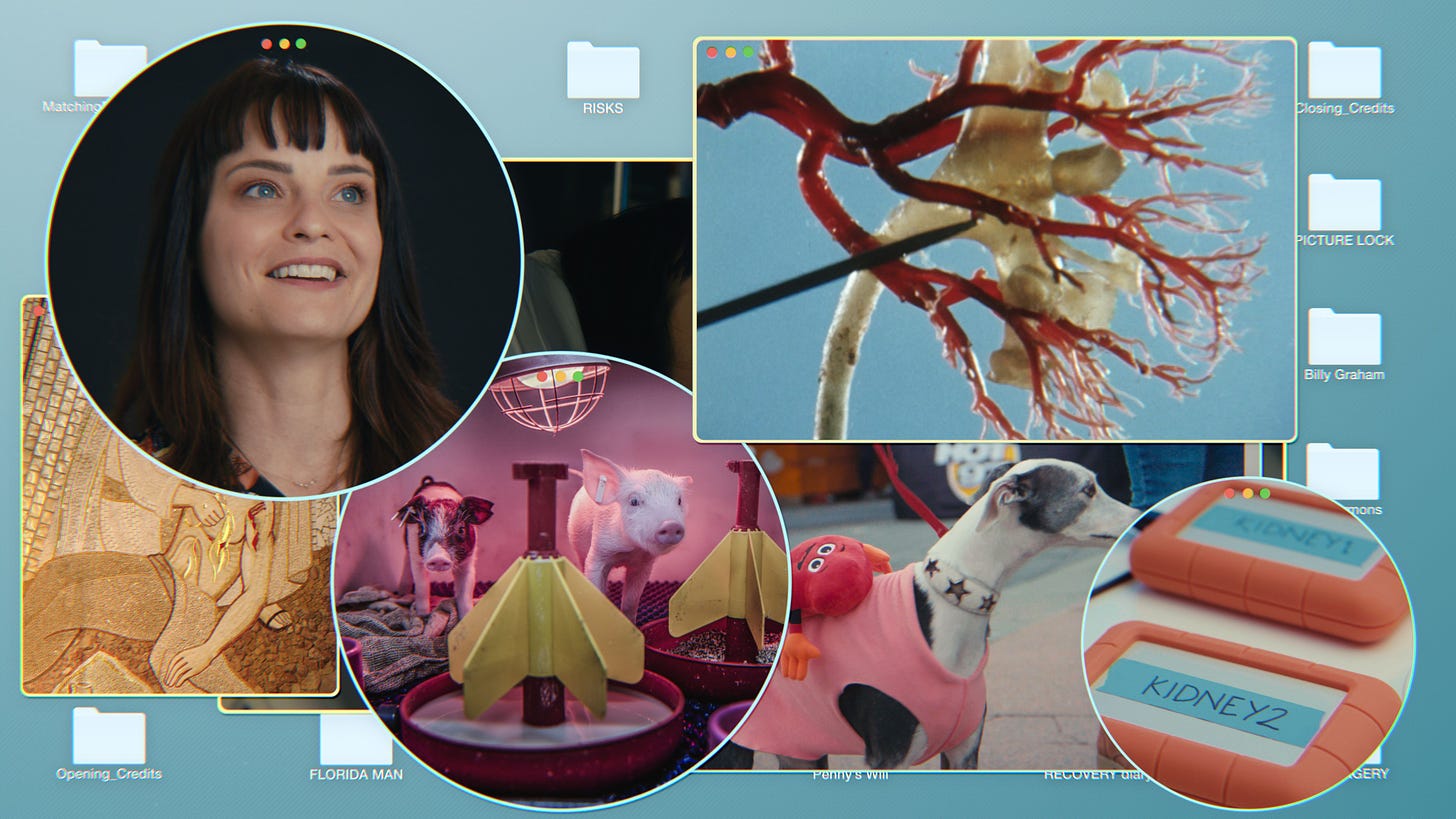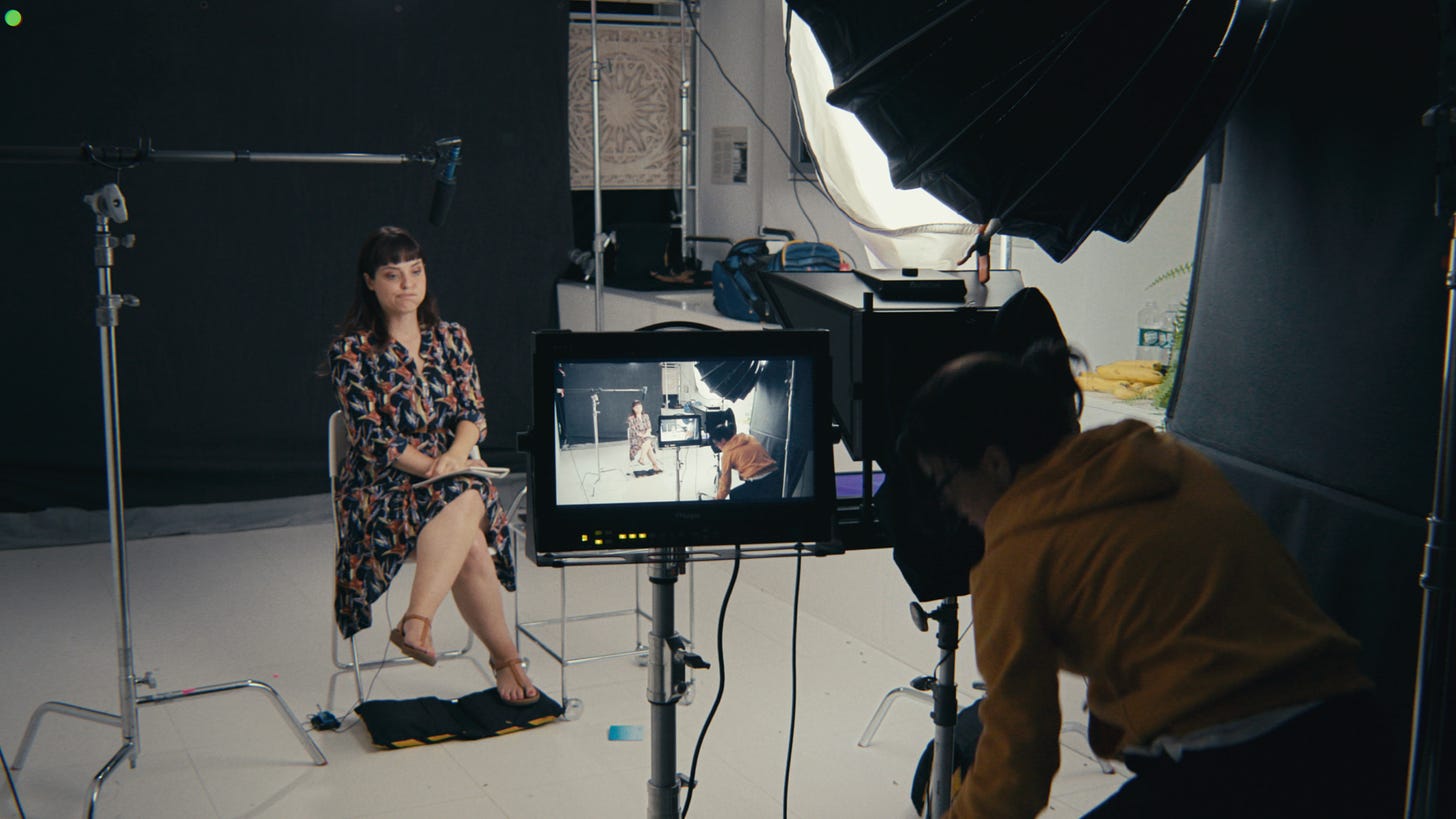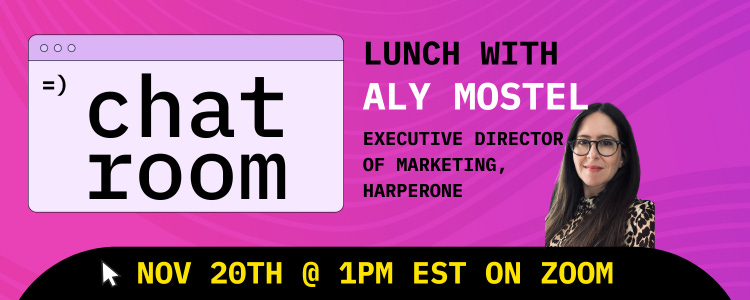If you followed Kidneygate on Twitter in 2021, you may have lost 12 hours of your life to niche literary drama, but you also may have become aware of altruistic kidney donors: the people who donate their organs to save the lives of complete strangers.
My friend Penny Lane1, the genius filmmaker behind Hail Satan? and Listening to Kenny G (the New Yorker called it “an ironic masterpiece”) has a new film, called Confessions of a Good Samaritan, that explores altruistic kidney donation through her decision to donate her own kidney. It’s available on Netflix now and I talked to Penny this week about making a “memoir plus” documentary (spoiler: she struggled with the same things all memoirists struggle with!)
1. When did you start looking into donating a kidney to a stranger? And at what point did you think "I should film this"?
I started looking into kidney donation in 2016, and ultimately went through with it in the summer of 2019. I didn’t start filming until a few days before my surgery, with my first “auto-interview” and a handful of interviews with other Good Samaritan donors. My primary motivator to start filming was that having full access to a character (myself, in this case) doing something so rare and cool and controversial was too good of an opportunity to pass on. Also, I knew that doing the film would be a good way to increase the impact of my donation by publicizing it and inspiring others.
At that time, the questions I wanted to ask with the film were clear, but the form and the plot were pretty nebulous. The main question that animated me was, “Why do so many people think I am weird for donating a kidney to a stranger?” My hook was this psychological mystery, which led me to explore various other controversies around the history, science and ethics of organ donation.
2. Part of what I love about your film is your ambivalence about making a documentary about yourself. I think all memoirists go through this: they're like, I'm writing a book about SUBJECT! Eighteen months in, it's like, oh shit I'm writing a book about ME. What mental blocks did you face as an artist when turning the camera on yourself (literally or metaphorically)? What felt icky?
Leigh, it’s a film about do-gooders starring myself. All of it felt icky! I thought initially I could get away with being in the film as a kind of “host” or guide, not as a protagonist per se. By the end, my story took up about 50% of the runtime. It worked out well for the film, because I was way harder on myself than I would have been on some other kidney donor. I really put myself through the wringer questioning my motivations and even my essential character.
It was exceptionally difficult to craft the Penny character, or the Penny persona. It’s always difficult to take a real person and turn them into a character, because you have to be super clear on which aspects of this real person’s personality/testimony are relevant to the story you are telling. And of course you end up leaving out almost everything, while trying to still represent the person accurately and fully. But when I had to do this to myself, this task felt nearly impossible. I simply had no idea what was or wasn’t relevant to this story! Luckily filmmaking is a highly collaborative effort, so I relied on my editors to basically take control of that process and make a lot of those choices for me.
I also told myself over and over I was creating a “personal essay” and not a memoir, which maybe isn’t really true, but it made me feel better for whatever reasons, so I went with it!
3. When I teach memoir, I talk about the voice of innocence vs. the voice of wisdom; ideally, these two voices are in conversation with each other on the page. The Penny who's speaking to camera before the surgery doesn't know what will happen to her; she has a lot of fear and anxiety. Then you film yourself post-surgery, watching footage of that former version of yourself, and commenting from a place of hindsight. Did you think about "before" and "after" Penny while you were making this?
There was most definitely a Before Penny and an After Penny. Luckily for the sake of differentiating them in the film, Before Penny was thin and anxious and After Penny was fat and depressed. Film is a visual medium! Anyway, that construct definitely came about in the editing process; it wasn’t something I knew I would be doing when I started out. I really had very little plot to hang the movie on, so having at least some sense that Penny had changed over the course of making the film was helpful.
Documentary filmmakers almost always have this problem where they missed the beginning of the story. Like, in fiction you include the ordinary world and the call to adventure, right? Whatever that is in a documentary usually happens before you pick up the camera. (That’s why you knew to pick up the camera!) Anyway, in this case, I obviously had made the decision to donate years before so I had a big problem of representing my experience before we started filming. That’s where the idea of having my diaries in the film came in!
4. Aside from the narrative of donating your kidney, you have many "plus" elements: the history of kidney donation, the brain science of altruism, bioethics, and the laws around incentivizing organ donation (or not). After I watched the film, I texted you, "I think I was expecting more of a kidney 101 but that’s probably just my ignorance as a viewer combined with you not setting out to make a movie about kidneys."
And you replied, "Yeah the problem is you think you want kidney 101 but it’s super boring!" How did you go about the research for all the history and science elements of the film? And what's going through your mind when you're figuring out what to include and what to cut or skip?
I never even got around to explaining what a kidney does, which is kind of funny. Yeah, the Kidney 101 content (i.e., “what is kidney disease?”) got put into the film a number of times but it always got taken out. Same with almost any statistics that weren’t comprehensible in spoken language. It just didn’t matter to the story I was telling. And movies are not a great vehicle for that kind of educational content, in my opinion!
That said, the topic was a real octopus, and it felt like it had too many tentacles going into too many fascinating topics. I have never made a film that has more scenes on the cutting room floor—seriously! It was super easy to just keep writing and narrating new scenes, and super hard to keep whittling down to what felt truly essential to my story and the questions I wanted to ask.
5. How did the story of the Good Samaritan become a framing device, or what I might call a designing principle, of the film?
The title came first. I liked the idea of the film being my “confessions” in part because it called back to St. Augustine and the birth of the memoir form (nerd alert) and in part because it made me laugh. Confessions of a Non-Directed Kidney Donor didn’t have the same ring as Confessions of a Good Samaritan, which I thought had a more immediately provocative effect. I should also mention that non-directed kidney donation is sometimes called Good Samaritan donation.
Once I had the title, I knew I’d need a Before Penny and an After Penny scene commenting specifically on the idea of being a Good Samaritan. Before Penny hated being called that because it felt kind of religious and sanctimonious, and After Penny came to like it and appreciate it because it did what I felt so deeply in my soul (and in my movie) I needed to do: put a frame around my experience, contextualize it into a long human story of wrestling with what we owe one another, particularly “the stranger.” See, I get goosebumps all over again just thinking about that! I could go on about the parable as a literary form, but instead I’ll suggest the book How To Do Things With Fictions by Joshua Landy to anyone interested in that topic.
Confessions of a Good Samaritan is available to stream now on Netflix
Leigh Stein Approved
Congratulations to Attention Economy subscriber
, who followed my advice on getting other people to share your stuff. Amelia wrote a post about how her unhappy childhood impacted how she raised her own children, pegged to Ina Garten’s new memoir, and then emailed a link to Anne Helen Peterson (184,000 subscribers), with the suggestion that Anne could use it as a springboard for a discussion thread on “How did your childhood, and the way you were parented, impact your decisions about having and raising kids?” Anne did exactly this, sharing Amelia’s post in a Friday thread that now has over 400 comments.Amelia told me, “I gained approximately 50 new subscribers. But more than the new subs, it felt very satisfying to read and reply to the comments in the Culture Study piece, and to have helped kick off such an interesting conversation. I also appreciated Anne's quick response and generosity in including a link to my piece. It felt like a meaningful way to make a professional connection with a writer I admire and respect.”
ICYMI
This week, Emily Gould announced a new newsletter called Book Gossip “about what we actually think about what we’re reading.” I subscribed!
From
, I learned about Kailyn Lowry, a former reality TV star who has become a top book influencer that I’ve admittedly… never heard of? She is the seventh most followed reviewer on Goodreads and runs a book club with over 2,500 paying members. I’ve seen BookTok creators earn income in a similar way, by hosting member-only book clubs on platforms like Geneva.
Upcoming Events
On November 13th, I’m hosting marketing strategist Lexi Merritt to teach a class on offer design for writers who want to earn more income by selling a class, a service, a book, or a paid tier of their Substack newsletter. Register here
On November 14th, I’m teaching a master class that will help you answer the question, “What’s your book about?” in a way that makes an agent or an editor go, I NEED THAT IN MY LIFE IMMEDIATELY. Register here
On November 20th, I’m hosting Aly Mostel, the Executive Director of Marketing at HarperOne for a Chat Room conversation (no advance registration necessary; this conversation is available to all my paid subscribers)
Yes, that’s really her name.







I donated a kidney to a husband of my friend. Didn’t even know his birthday at the time but it seemed like a good idea since I had 2 and he would otherwise die soothing kater. Worked out great! Didn’t really overthink it.
Can i just say that Attention Economy is the most educational newsletter ever? I’m excited to watch Penny’s film too :)